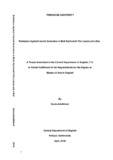Please use this identifier to cite or link to this item:
https://elibrary.tucl.edu.np/handle/123456789/3207Full metadata record
| DC Field | Value | Language |
|---|---|---|
| dc.contributor.author | Adhikari, Santosh | - |
| dc.date.accessioned | 2018-04-29T09:37:09Z | - |
| dc.date.accessioned | 2021-07-23T04:28:39Z | - |
| dc.date.available | 2018-04-29T09:37:09Z | - |
| dc.date.available | 2021-07-23T04:28:39Z | - |
| dc.date.issued | 2016 | - |
| dc.identifier.uri | http://elibrary.tucl.edu.np/handle/123456789/3207 | - |
| dc.description.abstract | This research explores how Anand frames his novel Two Leaves and a Bud as a protest against exploitation of British Empire over Indian locals and natural resources. Anand, in this novel, through the medium of Indian coolies, protests against the brutality and bestiality of the British colonizers and their sycophants. Postcolonial theory is applied to explore the domination of British owners (colonizers) and resistance posed by the Indian workers in Macpherson Tea Estate, Assam. Gangu, who represents the colonized Indians, is exploited and dehumanized. His wife dies of a disease and he was killed while trying to protect his daughter from being raped by a British officer. Through the characters such as Gangu and John De La Harve, Anand makes the people conscious about the excessive exploitation of the British colonizers and resists against the colonial oppression. Through this novel Anand endeavors to develop the resistive mentality among the colonized Indians. | en_US |
| dc.language.iso | en_US | en_US |
| dc.publisher | Central Department of English Kirtipur, Kathmandu | en_US |
| dc.subject | English literature | en_US |
| dc.subject | English noval | en_US |
| dc.subject | Leaves | en_US |
| dc.subject | buds | en_US |
| dc.title | Resistance Against Colonial Domination in Mulk Raj Anand’sTwo Leaves and a Bud | en_US |
| dc.type | Thesis | en_US |
| Appears in Collections: | English | |
Items in DSpace are protected by copyright, with all rights reserved, unless otherwise indicated.

